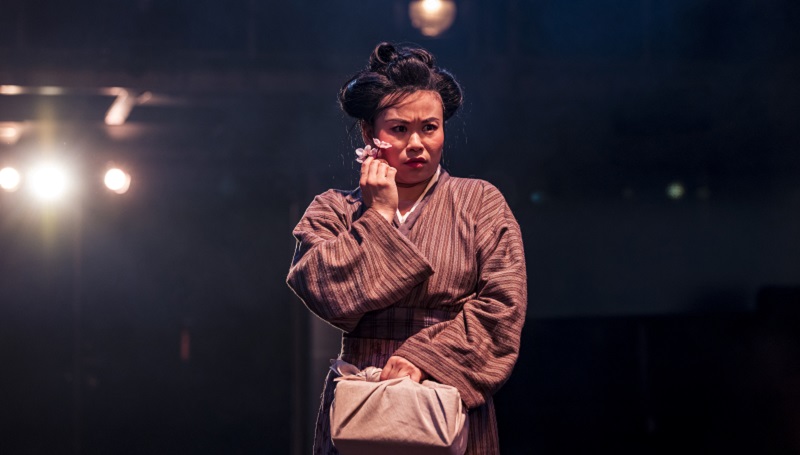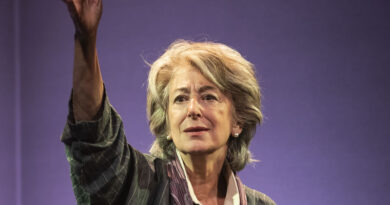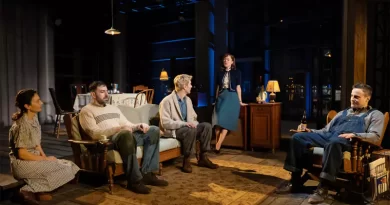untitled f*ck m*ss s**gon play at the Young Vic
Simon Jenner on the South Bank
1 October 2023
Kim’s having a bad day, and it spans over a century. Kimber Lee’s 2019 Bruntwood Prize-winning untitled f*ck m*ss s**gon play comes to the Young Vic directed by Roy Alexander Weise.
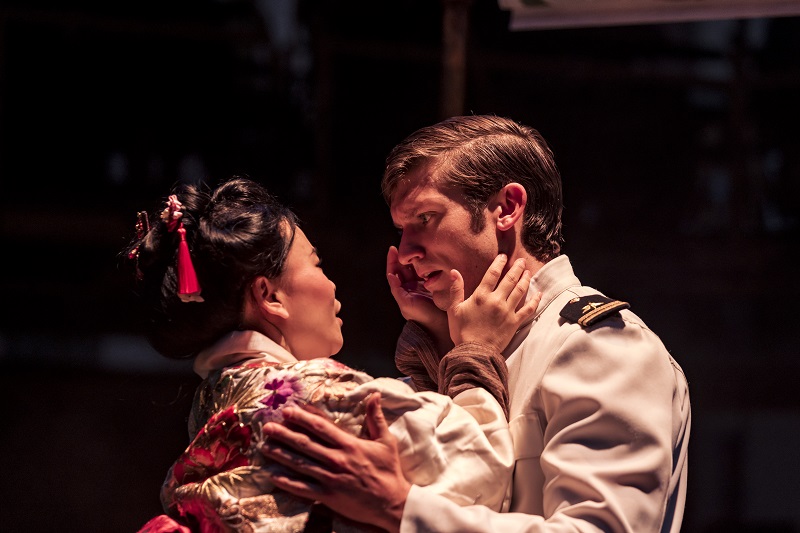
Mei Mac & Tom Weston-Jones.
Photo credit: The Other Richard.
Brought from the Royal Exchange, Manchester (as part of Manchester International Festival) and in association with Headlong, Lee’s play is both uproariously funny and scathing. Specifically it kicks out at western orientalism (in Edward Said’s sense) in iconic operas and musicals. Nominally sympathetic, they’re imbued with objectification and othering.
Lee’s particular scorn is reserved for the objectification of the “tragic” Asian woman, infantilized and sexualized in the same breath, then driven to suicide. All this accompanied by various pop songs chosen with deadly irony by Lee and realized by composer Ruth Chan.
Featuring a cast of six, Kim (Mei Mac) is centre-stage throughout, both hard-working and riveting as someone slowly breaking out from the projected orientalized woman to someone who swears at and savages western assumptions. The first half of the play, where the Narrator (Rochelle Rose, suavely droll) comments from the sidelines as Kim experiences western “oriental” narratives, becomes progressively telescoped.
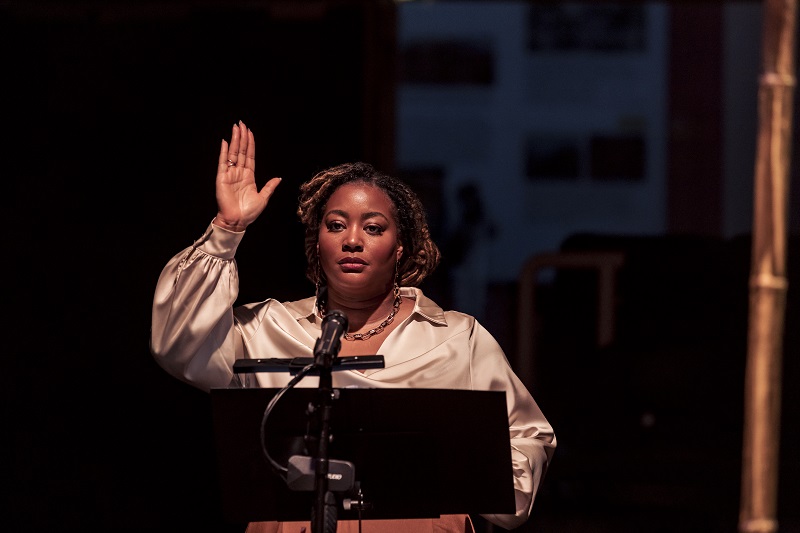
Rochelle Rose.
Photo credit: The Other Richard.
Thus at the start we’re at a stylized slimmed-down telling of the 1906 New York Metropolitan Opera House premiere of Puccini’s Madam Butterfly. Essentials are kept. Rosie (Lourdes Faberes) pushes Kim into the arms of Clark (Tom Weston-Jones) resembling Puccini’s Pinkerton as Kim does Butterfly. Seduction and, unbeknown to Clark, marriage are followed by four years, return with American wife Evelyn (Jennifer Kirby) to “honourably” claim the child; suicide.
It’s a pattern repeated in South Pacific mode (1949, that show’s premiere), the Korean War (1953 and M*A*S*H), and then in a set of variations on 1975, the year of the fall of Saigon and the end of the Vietnam War (invoking the show pilloried in the play’s title, Miss Saigon). Afi (Jeff D’Sangalang, bustling as he deploys Kim as a meal ticket) is sometimes Kim’s procurer, but the repeat story, across several Asian cultures, is exactly the same. Except that latterly Clark mildly reinvents himself and Evelyn forcibly takes the child-puppet from Kim – who’s given all encouragements to vary her suicide options as the periods become 20 seconds as decades flash between blackouts. That ends in 2005 with Oxycontin.
The point’s clear. The ritual story’s the same, as are the names. Objectification of the Asian woman’s exactly the same wherever she comes from: Japan, Polynesia “somewhere in the South Pacific”, Korea. Hence the strait-jacket of narrative tricked in Loren Elstein’s ever-changing costumes; and swirled in Shelley Maxwell’s movement that turns this earlier part into a Prozac ballet.
Though this is a one-hour-fifty show, it enjoys two distinct acts, and Khadija Raza’s set cedes its forlorn gazebo with screens and cherry-blossom and gives way to a more elaborate one of a plush dinner table and sofa on raised platforms wheeled on and off.
The slapstick first half with its tragedy-as-farce speed slows into three realist scenes set in 2023. Two are set in a fish section of Whole Foods in Harlem where Goro (D’Sangalang, excellent here) subjects Kim to a speech on aspiration; and Faberes as Cio Cio speaks in gestural silence.
In between there’s the longest scene: a dinner party. Rose is now guest Brenda, D’Sangalang as Harvard Business School tyro Afi is married to Evelyn, who was introduced by Clark (not before some intimacy), now married to Kim. Her mother Rosie (Faberes) looks on proudly. It doesn’t go well. There’s even a fleck of racism aimed by Clark on how he rescued Afi from a skip: “I made a new friend that day… who introduced me to the love of my life.” Very liberal. Weston-Jones never pushes the satirized, callow Clark beyond his thin envelope, but invests him here with a touch of baffled warmth.
Lee is generous with speeches. Each cast member’s allowed some, especially those who’ve had least to say. Thus first Faberes expands on what it is to feel assimilated and to negotiate othering in white movies – this is especially well done, and a foil to Kim’s narrative that Lee honours. Evelyn’s Kirby makes a hilariously inappropriate speech about feminism and sisterhood after Kim exhibits distress and ultimately rage at her more subtle objectification. Mac calibrates Kim’s drink-fuelled explosion (attempts to stop her drinking being part of it) with deadly humour.
The structure carries faint echoes of Caryl Churchill’s Top Girls. Earlier versions of a self are followed by a dinner party where everyone’s brought together, with a further denouement bringing sharp reality. Lee’s vision though is original.
The whole show shows Mac’s depiction of Kim from simpering lowered head (all these comedically repeated by the Narrator) to sexualized eager lover and emergent fury at her child snatched from her. By 2023 Kim’s had enough.
The denouement of the play, preceded by an explosive moment of nightmarish blinding light – Joshua Pharo’s lighting strikingly effective here – marks a return. It shows Lee is interested in fantasy as satire but, like many US-based playwrights, opts for realism to carry the final weight. An absorbing, brilliantly pointed play.

